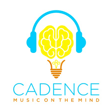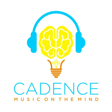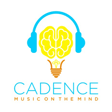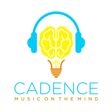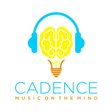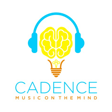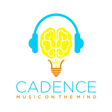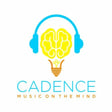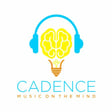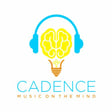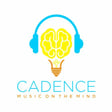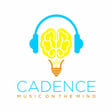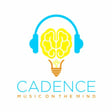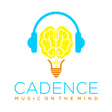Become a Creator today!Start creating today - Share your story with the world!
Start for free
00:00:00
00:00:01

Episode 06: What Musicians Hear
You often hear people say that music is good for your brain because it's the only activity that uses all of it. That's not true. And the truth is actually much more interesting. In this episode, we talk to auditory neuroscientist Nina Kraus, who explains how musical training changes what we hear, or, more specifically, how we listen.
Transcript
Introduction and Sponsorship
00:00:00
Speaker
The creation of this podcast and this episode is generously sponsored by the Germanicos Foundation.
Podcast Recommendation: Gastropod
00:00:05
Speaker
This week, I want to tell you about another great podcast that you should definitely go check out. It's called Gastropod, and it's a show about food. But it's not just about food. Really, it's about all the weird and wonderful things you never knew about the stuff you put in your mouth every day. Sort of like the weird and wonderful things that we talk about on this podcast, except instead of it going into your ears, it's going into your mouth.
00:00:27
Speaker
It's hosted by Cynthia Graber and Nicky Twilly, this award-winning show looks at food through the lens of science and history. So it explores things like whether or not adding salt to your food is really gonna kill you, and the science behind how bubbles get into seltzer. You'll come away equipped with all sorts of fun new facts, like knowing the best time of day to drink coffee, and whether there's any truth to the reputation that some foods have as aphrodisiacs.
00:00:51
Speaker
Who knew that the first ice cream recipe involved whale poop or that citrus is connected to the mafia? Listening to gastropod will basically make you into the most interesting person at any dinner party. You'll be able to speak knowledgeably about oysters, chocolate, cocktails, and kombucha, even mezcal.
00:01:08
Speaker
And in each new episode, served up every other week, you'll hear not only from scientists, historians, and chefs, but also agricultural detectives and former sex shop managers. Basically, you should definitely go listen to GasterPod now. Find it and subscribe in iTunes, Stitcher, or wherever you get your podcasts.
Music and Brain Engagement
00:01:35
Speaker
Welcome back to Cadence, the podcast where we explore what music can tell us about our minds. In the last few episodes, we've been exploring what happens in the brain when we are moved by music. And we learned that one key component of music that effectively engages us involves us being able to predict what's going to happen next and then maybe be surprised.
00:01:58
Speaker
I recently talked to producer and neuroscientist Dan Leviton, whose great books, The World in Six Songs and This is Your Brain on Music, really changed the way a lot of people think about music in the brain. And I wanted to hear what he thinks about this idea of the prediction component of music being particularly important.
00:02:20
Speaker
All the musical scales that we've studied have a limited number of tones. Our Western musical scale has 12 reports that some East Asian and Indian musics had 48, 50 tones. Those turn out not to be technically true. There's really just 15 tones and the others are ornaments and embellishments. So musical scales have this small number of tones, which creates, again, a constraint
00:02:48
Speaker
in the way that language is constrained. And those constraints allow us to express ourselves very richly in that people who are listening to what we're expressing musically can make predictions about what's going to happen next because there aren't that many ways it could go.
Music's Role in Memory and Learning
00:03:04
Speaker
So in language, if I say to you, Indra, the pizza was too hot to blank. There aren't that many ways you can finish the sentence. You want to try? Eat. And?
00:03:19
Speaker
uh gosh i don't know well right limited number maybe touch lift yeah touch yeah but you're not going to be saying the pizza was too hot to sleep and in music i could go and there's really only a small number of ways that you can finish that sequence that are going to sound right part of music's emotional power is that because of the constraints
00:03:44
Speaker
It's participatory, even though we don't consciously know we're doing it. Part of our prefrontal cortex in all of us is listening to figure out what's going to come next.
00:03:54
Speaker
Dan also agrees with Bob Greenberg, another previous guest, that there's something tribal about listening to music. I asked him why music can be so helpful when we're trying to learn new things, for example, like the alphabet.
Music, Social Bonds, and Oxytocin
00:04:05
Speaker
I still sing the ABCs when I'm trying to alphabetize a bunch of files. And the body parts, right? You put your right foot in, you put your right foot out, you do the hokey-pokey, and that, Indra, is what it's all about.
00:04:17
Speaker
I know it's my son keeps telling me that. And so it can be used as a very powerful mnemonic device. Well, sure. Like we learned from Steven Spielberg's Animadiacs, right? United States, Canada, Mexico, Panama, Haiti, Jamaica, Peru.
00:04:34
Speaker
Yeah, and when people ask me why that's the case, the answer I give is, you know, just there's another kind of hook for you to tag onto that it's a little bit like the method of loci remembering where, you know, it gives you a sequence through which you can create the next retrieval queue. Do you have a better explanation for why that might be the case?
00:04:54
Speaker
I have another explanation, but I don't think it's as good as yours. I like yours. Mine is just that it's twofold. The mutually reinforcing cues of melody, rhythm, accent, structure, and rhyme create constraints such that not just any word will fit into the melody. So because the words bind to the melody in prescribed and constrained ways,
00:05:20
Speaker
It's very easy to remember well-formed lyrics and information that's contained in lyrics. We've existed as a species for tens of thousands of years without written language. And the evidence is that music was the way that we kept track of important information that we needed to memorize before we could write it down.
00:05:41
Speaker
And so is that where you're thinking about where this cultural aspect or this group aspect of music comes in? Is that it's about generating a collective memory of the things that a particular group is learning? Yes. I think that in addition to knowledge being encapsulated by a community or a tribe or a family,
00:06:04
Speaker
Music also served other functions communally like bonding. We bond through certain songs, patriotic songs, or the song of our sports team. It's almost unthinkable that there would be a political rally without some music, right?
00:06:19
Speaker
And this points to a different system which is the oxytocin story. There's evidence that oxytocin is released when people listen to music together. Oxytocin is the hormone that's released in both mothers and infants during nursing. And it's a social saliency hormone that can help create tight bonds between individuals.
00:06:41
Speaker
It's also the horrible that's released during orgasm. And the fascinating thing about that is there's some evidence that it's only released when you have an orgasm with another person, not if you have an orgasm alone. Meaning that its purpose is to tie people together. And if it's released when we listen to music together, that's another piece of evidence for the social bonding function of music.
Impact of Music Training on Brain Structures
00:07:13
Speaker
So music connects people. It can be rewarding, especially when our expectations are set up and then violated in interesting ways. And it's a rich stimulus that hits us emotionally and intellectually. We talked a little bit in the last episode about what's happening in our brains when we enjoy music. But what about how our brains are changed by it? I often hear people say things like, music is so powerful because it's the only activity that uses all of our brain.
00:07:37
Speaker
Well, that's not true at all. In fact, as we become experts in some ways, we use less of our brain to listen to and even make music in particular areas. More of our cognitive resources then are available to help us make artistic choices when our skills are automatized and developed.
00:07:54
Speaker
But I wanted to get a richer understanding of just how music training changes the brain. So I talked to Nina Krause. She's a professor at Northwestern University, and her work investigates the neural encoding of speech and music. She's world-renowned in this particular area. And her work has a particular emphasis on plasticity, that is, how things change as we develop a relationship with music or other aspects of sound. I asked her, how does musical training change our brains?
Sounds and Brain Development
00:08:24
Speaker
Well, I think we have to stand back just a little bit and think about sound. We have to think about sound as a very powerful force in our lives, a force that is invisible. So often we aren't aware of how powerful it is and how much of an impact it has on our nervous system. And so the sounds of our lives, for better and for worse, change our brain. And it's really rather fascinating to me to be considering this because
00:08:54
Speaker
For visual stimuli, the information is static. It's in front of you. You can feel what the object is. You can see its shape, its contour. And sound, by definition, it's in movement. It's fleeting. It's abstract. But it has as many characteristics
00:09:16
Speaker
If you want to think of the analogies, it has as many characteristics as you can assign to a visual object. You know, you think of color, shape, texture. Well, sound has pitch, timing, timbre. These are harder to visualize because they're not as materialistic as the visual information. But the fact is that there are all of these different ingredients in sound waves, and our nervous system has to make sense of them.
00:09:44
Speaker
So we have figured out a way of accessing sound processing in the brain using scalp electrodes. We can measure the brain's response to sound and with unprecedented precision and granularity, we can determine how good a job the brain is doing at processing individual components of sound.
00:10:10
Speaker
So for example, if you are an expert, say you have a musical experience, it's not as though every aspect of sound processing, the pitch, the timing, the timbre, the stability is enhanced. It's not a volume knob. I like to use a mixing board as an analogy where we have many different ingredients of sound and based on the individual and based on the individual's life in sound,
00:10:40
Speaker
certain aspects of sound processing are going to be strengthened or weakened. So really the sounds of our lives shape our brains, but they shape our brains for better and for worse. For example, one of the things that is characteristic of making music is that you are connecting sound and meaning.
00:11:07
Speaker
if the relationship between sound and meaning is meaningless. So for example, if you are living around a lot of meaningless noise, or if you are living with linguistic deprivation, then that is going to affect how your brain responds to sound equally as if your interaction with sound
00:11:35
Speaker
is a meaningful one, but it will of course affect it in a negative manner. So, you know, there's always this push and pull.
Sound Processing and Life Experiences
00:11:52
Speaker
So I need to stop a minute and have a little rant, if you'll forgive me. There's a popular trend now, especially amongst young parents or new parents, I should say, parents of young children, to use white noise to soothe their babies to sleep. And in fact, there are several studies to show that this is very effective. Kids who are exposed to white noise, even in very early infancy, will fall asleep more quickly and stay asleep longer than kids who aren't exposed to white noise.
00:12:19
Speaker
But what effect does that ultimately have on the development of their auditory cortex? All the way back in 1972, there is a small study of eight male college students who were exposed to white noise versus quiet while they were sleeping. On the nights in which they had the noise playing, they actually spent much less time in rapid eye movement sleep and more time in the shallower levels of sleep, sleep stages one and two.
00:12:46
Speaker
They paid that sleep debt on the nights then when they were allowed to sleep in quiet. But it made me wonder what impact that has on little kids who have to spend a lot of time in particular stages of sleep. Sleep is so important for babies and toddlers as they develop because that's when their brains really are
00:13:04
Speaker
creating a lot of connections, making sense of the world, and so forth. We know that kids that go through developmental milestones have disruptions in their sleep, but we also know that sleep is incredibly important for consolidating information and changing the way memories are stored in the brain. There was also a study from 2015 showing that background noise during the day has a negative effect on speech perception in toddlers. Now, that's during the day, you could argue. Maybe it's not harmful at night when they're sleeping, but who knows? Those studies haven't been done, in my opinion.
00:13:34
Speaker
at least not well, that I've discovered. If any of you have found a better study, please do tell me about it. We also know that playing white noise to infant rat pups delays their auditory cortex maturation in ways that are easily measurable.
00:13:52
Speaker
So if you are exposed constantly to white noise, wouldn't that mean that the way that the brain processes noise is going to be shifted and changed? And maybe even after a while you ignore it and you learn to ignore it and you have a harder time than processing meaning from that sound. It makes me wonder if speech delays or auditory processing delays might be prevalent in kids who are exposed to white noise for long periods of time and infancy.
00:14:19
Speaker
Okay, so that's the end of my rant. Back to Nina Krauss.
Musicians and Cognitive Resources
00:14:23
Speaker
I asked her if this is a little bit like seeing the trees for the forest in the case of the musician. Are they able to see differences between the leaves of the trees, for example, but less able to focus on the gist, you know, the entire forest? No, I wouldn't say that. Because I think that you're asking about perspective. And I think that really the more you are able to
00:14:47
Speaker
get information from the details. And it's not as though the musician who is picking up on the harmonics is not processing the fundamental frequency. He's just deriving it from the information that he can process very well through the harmonics. So he's getting there another way. So he's still getting that information. But he's getting it through perhaps a more complicated and enriched route. But so that frees up, if you will, some computing power.
00:15:15
Speaker
that the non-musician might be spending really holding on to that fundamental frequency because that's the one aspect of sound that they can really process very well. I also wondered whether playing or composing music was the key feature or whether you could develop some of these same changes just by listening to a lot of music. When we think about hearing and sound processing in the brain, I think it's useful to think of hearing
00:15:42
Speaker
as including a network of many systems. So we like to think of hearing as involving cognitive, sensory motor, and reward systems. And these are areas and systems in the nervous system that are far-flung, and they yet interact with each other extremely deeply. And so on the one hand,
00:16:12
Speaker
Yes, in terms of neuronal pruning and circuitry that you use again and again, you develop certain pathways that become more efficient, if you will, but you also can reach deeper and wider and encompass all these different aspects of sound to a greater extent, the more intricate and sensitive the network ultimately becomes.
00:16:40
Speaker
But it's very much of an active process. Also, people ask me, oh, what about listening to music? I listen to music all the time. Music is a huge part of everyone's experience. And for the kind of changes that I'm talking about in terms of fundamental ways in which your default hearing system has changed based on your life and sound, this happens with active sound to meaning connections.
00:17:11
Speaker
I like to say you're not going to get physically fit watching sports. What we are finding is that there is a general, what we might call a musician signature. And you get to that musician signature irrespective of the instrument you play, regardless of the genre, also regardless of whether you are learning music by note reading or improvising
00:17:39
Speaker
so-called by ear, which is, of course, by brain. In order to get a better sense of how these changes affect a person's behavior, I talked to Rian Xian. He's the composer of much of the music that you hear on this podcast.
00:17:53
Speaker
My name is Rian Sheehan. I'm a, I guess I'm a composer. Predominantly I write music for, ah, goodness me, multimedia, planetarium shows, film, television, advertising, everything I can really get my hands on. And I'm based in Wellington, New Zealand. And occasionally I release an album. I asked Rian recently how he would describe his work.
00:18:22
Speaker
I wouldn't define my own music as ambient or post-rock or classical even, although there are all of those elements within it. I know it's been hard for my record labels that I've been with over the years to pinpoint what genre my music is because even on my earlier electronic albums, there were tracks that were just acoustic guitar on their own. So I'm funny about genres. I don't know. I think of my own music as, I would describe it as
00:18:56
Speaker
A lot of musicians seem to be like that, and I think it reflects a very different relationship that they have with sound. Rian is particularly interested, like a lot of musicians, in engaging with the audience and eliciting some kind of a reaction.
00:19:08
Speaker
My main goal is to design or write music that is engaging, really, for a listener. I'm thinking about other people's experiences and how they would listen to a body of work and what would be interesting to listen to. Again, that connects to this idea of finding significance in sound. I asked him, what does classical or composed music, which is where I spend most of my musical life, have in common with the kind of music that he composes?
00:19:37
Speaker
They are similar in the way that they are both evoking emotion. And if you're talking ambient genre in both of those genres, they do cross over. The idea or the intention of those genres is to create big emotional soundscapes. So I think they do naturally merge together.
00:20:08
Speaker
you
00:20:26
Speaker
So many musicians, of course, have a very powerful relationship with all kinds of sounds, not just the genre in which they play and make music. Ultimately, the instrument and genre they choose maybe even happens by random accident or just what they were exposed to in their early or formative years.
00:20:42
Speaker
My mother was actually in a band and I grew up in Australia for a while. And when I was about five until seven, I think I was there and they toured around a bit. And I guess that was my first introduction into music really, live music and watching players perform. So yeah, I guess from an early age, I was around other people making music. I think I only picked up a guitar when I was 13
00:21:11
Speaker
was pretty late compared to some people. My son's eight and he's already playing guitar. I decided I think when I was maybe seven, well I started playing in bands when I was 15 or 16 in school bands and I can't actually work out where or when there was a moment that I actually decided that I wanted to be a composer. In a strange way it was something like, I don't know, I really, I fell into it almost, just
00:21:37
Speaker
There's nothing else I can do. There's nothing else I'm qualified at or so I just ended up being here and doing what I do. So I wondered whether the type of instrument or genre that a person spends their time learning and playing makes a difference fundamentally in terms of how the brain processes sound for music. Back to Nina Krauss.
Musical Training and Brain Networks
00:21:55
Speaker
So what matters in order to get the fundamental musician signature and one that really has benefits for our ability to process language
00:22:04
Speaker
It doesn't seem to matter what instrument and what genre and how you learn to play the music. That said, there is specialization of the specialized so that if you play the bassoon, your brain is going to be much better able to pick up on all of the nuances of the bassoon than if you're a pianist. Also, again, this is just emerging evidence, but in work that we have done where we have looked at how a person
00:22:32
Speaker
learns a musical instrument. Well, we don't see that there are differences in the musician's signature if the musician has learned through note reading or by listening to the sounds. But in the couple of individuals, and there are not that many who are really bilingual, in other words, who can really both read music and improvise and learn
00:22:55
Speaker
By ear, these are the ones who seem to have some of the strongest and more detailed networks. That does seem to describe Breen and many other musicians who are widely considered to be particularly skilled. So we've learned that a child's relationship with music shapes how their brains develop, particularly when it comes to extracting meaning from sounds. And this ability to create or play sounds that are meaningful highlights one of the reasons why even people who aren't musicians can enjoy music.
00:23:22
Speaker
Our brains are wired to a large extent to find meaning in patterns even of random things, but of course this is much easier and more enjoyable when the meaning is actually there or when there even are multiple meanings to discover. Finding meaning in the universe is to some extent the job of theoretical physicists.
The Quest for Meaning in Music
00:23:39
Speaker
So I recently asked Sean Carroll, a physicist at Caltech, and the author of a book called The Big Picture, which talks about finding and extracting meaning in the universe. Whether finding meaning in music is sort of like finding meaning in a universe where we are just tiny, infinitesimal specks.
00:23:56
Speaker
Absolutely. And in fact, my previous book was about the discovery of the Higgs boson. And we spent a lot of money doing it, $9 billion to build a large Hadron Collider outside Geneva. It took decades of work, thousands of physicists devoting their lives literally to looking for this thing. And at the end of the day, you see this little bump in a graph and go, oh, yes, there it is. It must have been this Higgs boson. And it's very, very
00:24:19
Speaker
natural, if you're not a professional physicist, to say, why did you bother doing that? What are we going to be able to build? Do we get jet packs now? Do we get faster than the speed of light travel? Or what is out there? And the honest truth is that nothing is out there. There is no technological application that we can currently possibly imagine to finding the Higgs boson.
00:24:39
Speaker
The reason why we did it is because we want to know the answer. We were curious. It's really much closer to the reasons why we do music or literature or art. It's because we human beings are more than just organic creatures that survive from moment to moment. We try to put ourselves in a bigger context to attach some meaning to our lives. Curiosity, just like art and music, can be sources for that meaning.
00:25:05
Speaker
And I think a lot of physicists actually have music as a hobby or are really fascinated by music. Why do you think that is? Yeah, I mean, I love music very much. Sadly, I'm terrible at it. So I played the violin when I was in elementary school. I was terrible at it, you know, and I loved it. Maybe if I had played the saxophone instead of the violin, my career might have gone differently. But I love, you know, when I was at the University of Chicago on the south side of Chicago, we would go down Tuesday nights.
00:25:33
Speaker
to the south side of Chicago, to places like the New Apartment Lounge, to hear Von Freeman, who is a famous saxophone player who used to play with Miles Davis, and they would have jam sessions starting at 10pm going on to the night. And I would bring visitors who came to give talks at the university to listen to this wonderful
00:25:50
Speaker
slice of Americana that you just can't get anymore. And I don't know why. I think that there's some connection between patterns and rhythms and numbers. I don't want to strain the analogy too much, right? But scientists are, on the one hand, creative. You know, they come up with explanations for things. And on the other hand, they like structure. They like theories and predictions and things like that.
00:26:16
Speaker
And I think that part of that balance between the creativity and the structure can also be found in music, right? Like, music is not interesting if you just play the same note over and over again. It's also not interesting if you just play random notes, right? There's some structure there, there's some pattern there, there's some repetition, there's some rhythm. And I think that there is, you know, a lot of sympathy. Music is a little bit more visceral than doing sciences. But this back and forth between structure and creativity is common to both endeavors.
Music and the Concept of Time
00:26:43
Speaker
Sometimes I hear people say that there is some kind of physical reason why we enjoy music. Do you think there's any truth to that or should we really stick to how the brain interprets music and whether or not we feel connected to the musicians and so forth? Or do you think that there's something about, you know, the cosmos that music plays a role in?
00:27:06
Speaker
You know, my first ever popular book was on time and the arrow of time. And even before you get to time's arrow, you get to the question of how you measure time and what time is. How do you measure time? Well, you look at a clock. So what is a clock? A clock is something that does the same thing over and over again in a repetitive way, predictably compared to other clocks that are also doing the same thing over and over again.
00:27:30
Speaker
And we have a feeling inside our bodies for the passage of time because, in part, we are full of clocks. You know, we have our breathing, we have our heartbeats, we have the neural impulses rushing around our nervous system and so forth. We have things that happen over and over again. We have a natural sense of rhythm, if you like.
00:27:50
Speaker
And I think that, you know, it is the least surprising thing in the world to think that this kind of rhythmic but not perfectly predictable kinds of patterns you find in music have a natural resonance with us as biological or physical creatures, because, you know, there's these things that the most primitive kind of music is just rhythmic, right? It's just like, and then you add on to that and make it more complicated. Of course.
00:28:15
Speaker
that resonates with us at a fundamental level. As someone who thinks about the nature of time, that makes absolute sense to me. And that leads us to our next episode, where we'll be exploring how we process time and rhythm in music.
00:28:32
Speaker
Thank you for listening to this episode of Cadence. You can find us online at the ensembleproject.com slash cadence at facebook slash cadence podcast and on twitter at cadence podcast. You can also get in touch with us at cadencemind at gmail.com. Cadence is produced by Adam Isaac and me, Indre Viscontis. I also created and write the show.
00:28:51
Speaker
The music in this episode was provided for us by acclaimed New Zealand composer Rian Sheehan. Check him out at riansheehan.com. You can find me on Twitter at intravis. Cadence is generously supported by the Germanicos Foundation. And go check out Gasterpod, one of my favorite podcasts. Join us in two weeks for our next episode in which we continue our exploration into what music tells us about the mind.
